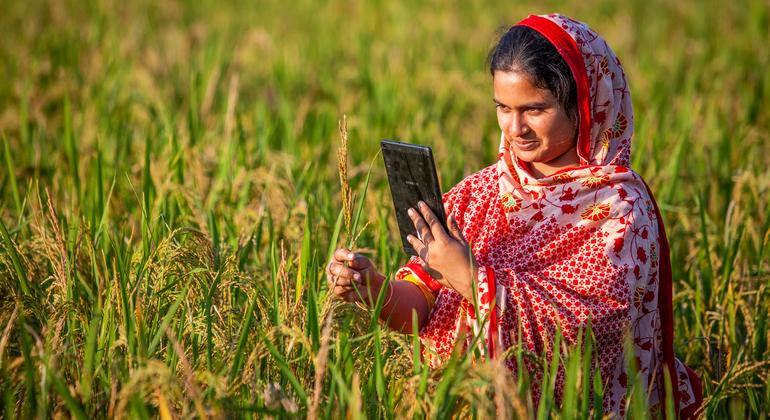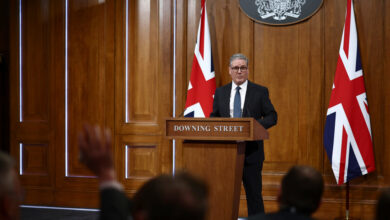Efforts to connect a digitally divided world and combat AI threats

Earlier this year, an audience in a Geneva conference hall was captivated by a video screen showing a live image of a 25-year-old Portuguese man suffering from “locked-in syndrome,” a severe neurological disorder that causes patients to lose control of their bodies; about two years after developing the condition, he was unable to move or speak.
However, he was still able to interact with the audience and answer a series of questions, using his mind to connect with an AI-powered digital tool to translate his thoughts into words using his voice.

A woman greets a robot at the AI for Good 2024 Global Summit in Geneva.
Lives are being saved by AI
The experience was overwhelming for many in the audience, some of whom were moved to tears. “I had to pull myself together,” said Fred Werner, Head of Strategic Partnerships at the International Telecommunication Union (International Telecommunication Union), the United Nations digital agency and one of the organizing units AI for Good summit. “There are certainly many discussions about safety, privacy, ethics and sustainability, but I don’t think it’s an exaggeration to say that AI is saving lives.”
Mr. Werner is quick to point out that the UN is not ignoring the positive aspects of AI. “We have identified more than 400 applications of AI across the UN system. AI is being used in many areas, from disaster management to human rights monitoring, many activities related to sustainable development.”
While the AI technology demonstration in Geneva is a prime example of the positive impact artificial intelligence can have on human life, Mr Werner admits that excitement about the potential benefits of AI is tempered by risks.
“I think AI is moving so fast that there is no time to waste. How do we deal with deepfakes and disinformation? We have to really work together to create international AI standards.”

In New Delhi, India, a poster works to dispel myths about COVID-19 vaccines.
The Dilemma of Misinformation
This September, at Summit of the Futurea landmark conference of the United Nations, the member states of the Organization will adopt a Global Digital Pactincluding warnings about the consequences of AI being used for malicious purposes, deepening divisions within and between countries, increasing instability, violating human rights and exacerbating inequality.
The treaty aims to increase trust in the internet, ensure people have more choice over how their data is used, and clarify accountability for discriminatory and misleading content.
This is the latest step by the United Nations toward effective international AI governance. A breakthrough was achieved in November 2021, when the 193 member states of the UN science agency, UNESCOadopted the first global agreement on human-centered artificial intelligence, Recommendations on the Ethics of AIA guide for all governments in developing laws and strategies for AI, aimed at protecting human rights and freedoms.
https://news.un.org/en/audio/2024/01/1145157
Two years later, the United Nations Secretary-General António Guterres has brought together some of the brightest minds in technology, from both the public and private sectors, to form Artificial Intelligence Consulting38 members concluded, in a report concludes that AI “calls for governance, not just to address its challenges and risks, but also to ensure we harness its potential in a way that leaves no one behind.”
This work contributed to the development of the Global Digital Compact, which includes a list of commitments and actions. Some relate to the so-called “digital divide”: the 2.6 billion people who lack access to the Internet, cutting them off from the opportunities offered by online tools. The compact calls for bringing all schools and hospitals online, drawing on support from the United Nations. Giga Initiativeand digital literacy skills training. An International Scientific Council on AI and an annual Global Dialogue on AI Governance will be established, and it is hoped that by 2030 there will be global AI standards that benefit everyone.




